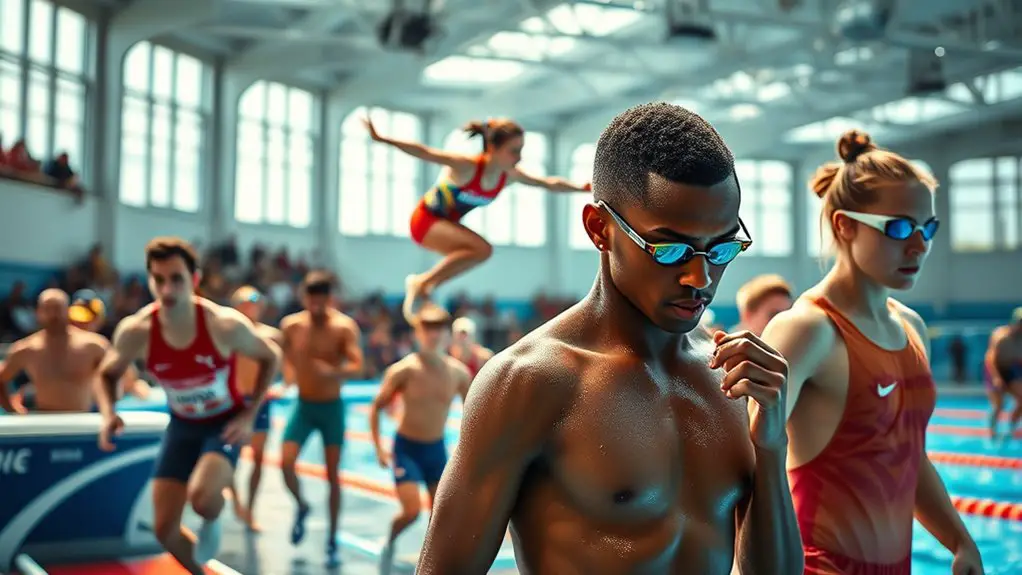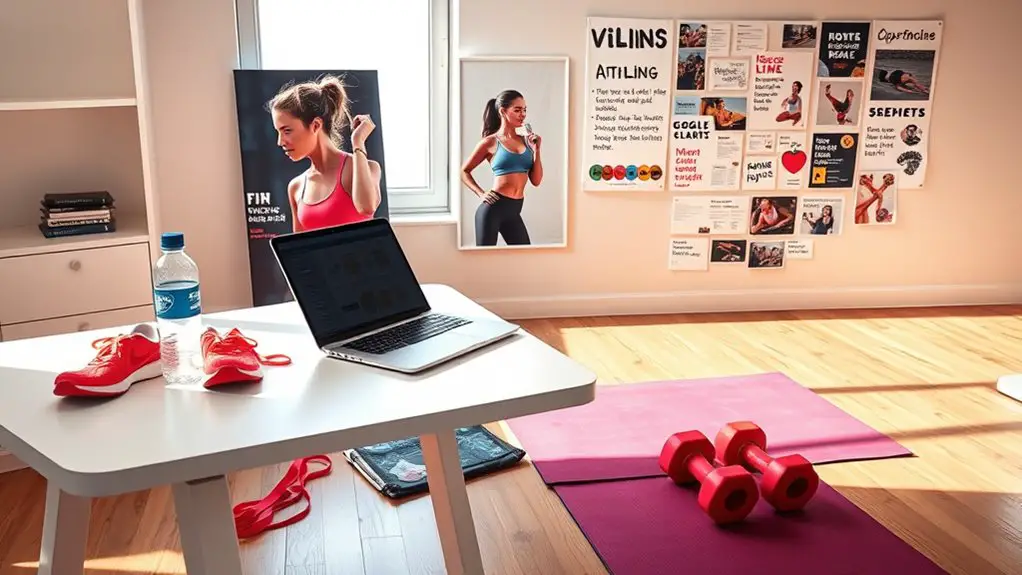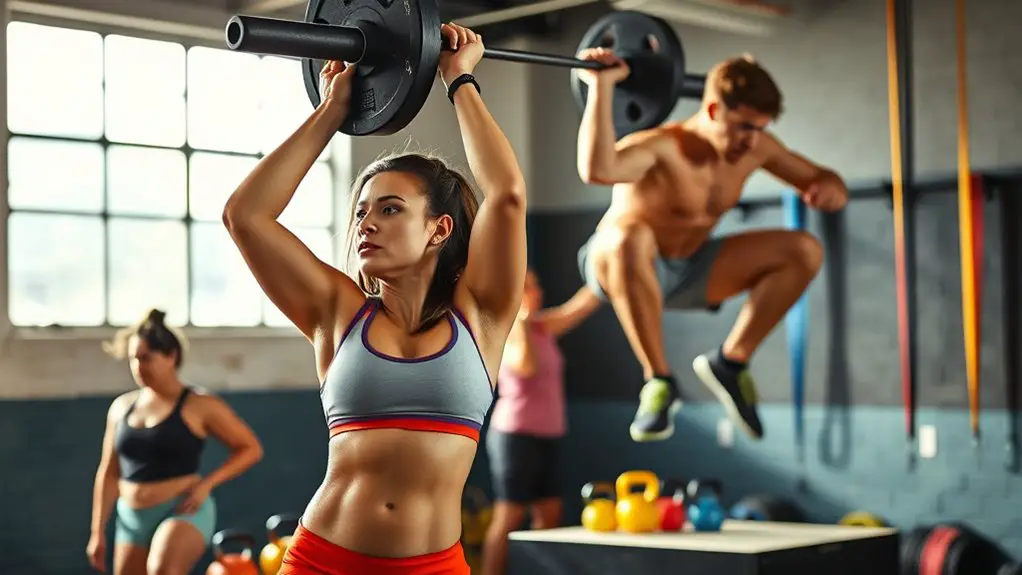To prepare for the Olympics, you set clear goals and break them into manageable steps. You develop a tailored training regimen that addresses your unique strengths and weaknesses, while focusing on endurance, strength, and skill. Nutrition plays a key role, ensuring you eat a balanced diet and stay hydrated. Mental preparation with visualization techniques helps build confidence. You also prioritize recovery and injury prevention to maintain peak performance. There's much more to explore in this journey.
Setting Goals and Objectives
When it comes to preparing for the Olympics, setting goals and objectives is essential to an athlete's success. You've gotta have a clear vision of what you want to achieve. Break down your aspirations into manageable milestones, whether it's improving your time, mastering a technique, or boosting your mental resilience. These goals give you direction and purpose, fueling your passion and drive. Remember, your ambitions should be challenging yet attainable, pushing you to reach your personal best. Regularly reassess your objectives to stay on track and adapt to changes. By defining your path, you embrace the freedom to explore your limits, releasing the potential within you. Stay committed, and you'll pave the way toward Olympic glory.
Developing a Tailored Training Regimen
As you commence your Olympic journey, developing a tailored training regimen is essential for maximizing your performance. Your training should reflect your unique skills, strengths, and weaknesses, allowing you to embrace your freedom while pushing your limits.
Here's a simple framework to guide your regimen:
| Training Focus | Activity Examples |
|---|---|
| Endurance | Long-distance runs, cycling |
| Strength Training | Weightlifting, plyometrics |
| Skill Development | Sport-specific drills |
Integrate various activities and listen to your body. Adjust your regimen based on progress, ensuring it remains dynamic and responsive. Remember, this journey is yours—embrace it, and let your training reflect your individuality.
Nutrition and Diet Strategies
To achieve peak performance during the Olympic Games, you can't underestimate the importance of nutrition and diet strategies. Your body needs the right fuel to function effectively, so focus on a balanced diet rich in carbohydrates, proteins, and healthy fats. Carbs provide energy for those intense training sessions, while proteins help repair and build muscles. Don't forget hydration—staying hydrated keeps your energy levels high and aids recovery.
Consider meal timing, too; eating the right foods before and after workouts can enhance your performance. Supplements can be beneficial, but consult a nutritionist to find what's best for you. By prioritizing your nutrition, you'll feel empowered and ready to give your all at the Games!
Mental Preparation and Visualization Techniques
Nutrition plays a significant role in preparing your body for competition, but mental preparation is just as essential for achieving peak performance. Visualization techniques can help you mentally rehearse your routines, making them feel more familiar and achievable. Picture yourself succeeding—feel the excitement and confidence swell within you. This practice can reduce anxiety and sharpen your focus when it matters most.
Additionally, mindfulness can ground you, centering your thoughts and allowing you to embrace the present moment. Whether it's through meditation, deep breathing, or affirmations, these tools empower you to take control of your mindset. By cultivating a strong mental game, you'll release your true potential and experience the freedom to perform at your best when the stakes are highest.
Recovery and Injury Prevention
While competing at the highest level, athletes can't overlook the importance of recovery and injury prevention in their training regimens. Prioritizing these aspects not only enhances performance but also guarantees you stay in the game longer. Here are some key practices to regard:
Athletes must prioritize recovery and injury prevention to enhance performance and prolong their careers.
- Active Recovery: Incorporate low-intensity workouts to keep blood flowing.
- Proper Hydration: Stay hydrated to support muscle function and recovery.
- Nutrition: Fuel your body with the right nutrients to aid in repair.
- Rest Days: Schedule time off to allow your body to heal and rejuvenate.
- Physical Therapy: Regular sessions can identify and address potential issues before they become serious.
Competing in Trials and Qualifiers
After focusing on recovery and injury prevention, it is vital to tackle the competitive aspect of training: trials and qualifiers. This is where you truly test your skills against others aiming for the same goal. You'll face high-pressure situations that require not just physical strength, but mental resilience. It is important to embrace the thrill of competition; each trial is an opportunity to showcase your hard work. Keep your mindset positive and focus on the process, not just the outcome. Trust your training, and remember, it's about finding your rhythm and flow. You'll learn to adapt to various environments and conditions. Competing in these events is a vital step toward your Olympic dream—seize the moment and let your passion shine!
Analyzing Performance and Making Adjustments
As you evaluate your performance post-competition, it's crucial to identify areas for improvement and make necessary adjustments. This reflection helps you grow and refine your skills, ensuring you're ready for the next challenge. Consider these key aspects:
- Analyze your technique: Break down your movements and identify any flaws.
- Review your mental game: Assess your focus and confidence during the event.
- Gather feedback: Talk to coaches or fellow athletes for outside perspectives.
- Set new goals: Transform insights into specific, measurable objectives for future training.
- Experiment with strategies: Test different approaches in practice to find what works best.
Building a Support System and Team
To succeed at the Olympic level, you can't underestimate the importance of building a strong support system and team. Surrounding yourself with the right people—coaches, nutritionists, and mental health professionals—can make all the difference. They provide guidance, motivation, and a sense of community, essential for your journey.
| Role | Responsibilities | Importance |
|---|---|---|
| Coach | Training and technique | Direct performance improvement |
| Nutritionist | Meal plans and hydration | ideal physical condition |
| Psychologist | Mental health and focus | Enhances competitive edge |
| Team Members | Support and camaraderie | Builds morale and accountability |
Frequently Asked Questions
How Do Athletes Choose Their Sports for the Olympics?
When choosing a sport for the Olympics, you'll consider your passion, skills, and opportunities. Exploring various disciplines helps you discover where you excel, ultimately guiding you toward a path that resonates with your unique strengths.
What Role Do Sponsors Play in an Athlete's Preparation?
Imagine the thrill of soaring through the air, fueled by financial support. Sponsors help you afford training gear, nutrition, and travel, giving you the freedom to focus on your dreams without the weight of financial worries.
How Do Athletes Handle Media Attention During Training?
You'll find athletes often embrace media attention, using it as motivation. They set boundaries, focusing on training while sharing their journeys. It's about balance—leveraging exposure without letting it distract from their ultimate goals.
What Are Common Misconceptions About Olympic Training?
Many think Olympic training's just about grueling workouts. In reality, it's a delicate dance of discipline and recovery. You've got to balance intensity with rest, or you risk burning out before the finish line.
How Do Athletes Celebrate After the Games?
After the games, you'll celebrate with joy and camaraderie, enjoying time with teammates and loved ones. Whether it's parties, travel, or personal reflection, it's a moment to embrace your hard work and achievements.




